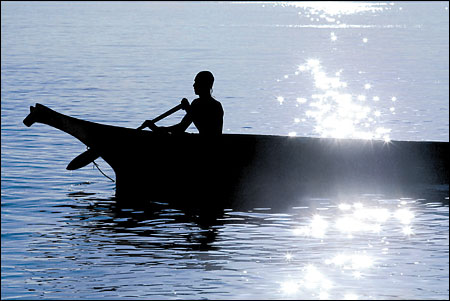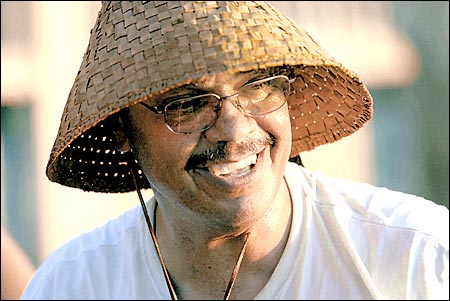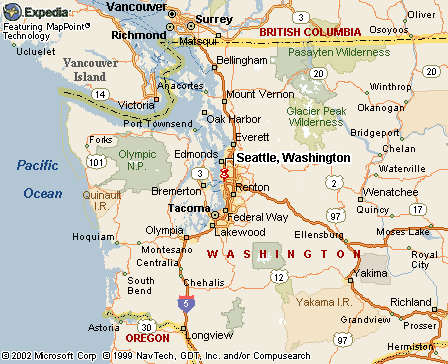|
|
Canku Ota |
|
|
(Many Paths) |
||
|
An Online Newsletter Celebrating Native America |
||
|
September 7, 2002 - Issue 69 |
||
|
|
||
|
Duwamish Share Lessons of the Water With Others |
||
|
By D. Parvaz Seattle
Post-Intelligencer
|
||
|
Photo Credits: Renee
C. Byer/Seattle Post-Intelligencer
|
 The
water has many lessons to teach: The
water has many lessons to teach:
Humility. Respect. Tradition. For all those reasons and more, several American Indian tribes have chosen to take part in The Spirit Returns Paddle -- the finale to Seattle's sesquicentennial celebrations this weekend. Mike Evans, a Kent Fire Department lieutenant, was clearly in his element as he took some young tribal members on a practice paddle at Redondo Beach last week. "The paddle gives direction for the future," said Evans, a member of the Snohomish tribe. "It shows that there are things more important than drugs, alcohol, sex or whatever kids are doing these days." During The Spirit Returns Paddle, which symbolizes a return home, members of various tribes will maneuver up to 15 cedar canoes to the shore. And the place now known as Terminal 107 Park was also the site of the "Ha-Ah Poos" Duwamish village, where Chief Seattle lived as a child. It is here that the tribe hopes to start work on the Duwamish Long- house and Cultural Center by 2003. As many as 15 tribes from Western Washington and British Columbia are expected to participate. There, at Terminal 107, a leader from each canoe will announce their arrival and ask permission to land. They will be greeted by Duwamish tribal leader Cecil Hansen, as the tribe first greeted white settlers in 1851. Cheyenne, 5, Ashley, 9, Austin, 7, and Blake, 11, all of the Duwamish Shelafoe family, watched the cedar canoe in the distance. They were taking turns going into the water with Evans, some more enthusiastically than others. When asked if she's afraid of water, Dana brushed sand off her legs and deadpanned, "No, I'm afraid of drowning." Although her stepmother, Karen Condos, seemed confident that Dana would take part, she realized she might have to do some convincing. "It's important, more than anything, to show that we do exist," Condos said. The Duwamish, Seattle's only indigenous tribe, isn't recognized by the federal government and doesn't have a reservation. The Duwamish, like some other tribes, ceded their land to the government under the Treaty of Point Elliott in 1855. But the main goal of the paddle isn't about land claims or battles over government recognition, Hansen said. Rather, it's to illustrate the harmonious moments between the Duwamish and the white settlers. "This is a celebration of coming together, white people and Native American people," Hansen said. "Isn't it wonderful that the tribe is being involved in that? We haven't really been invited to anything -- it's always a last-minute, 'Oh, we should invite the Duwamish.'" "We have to rise above all that." She said the event is meant to celebrate not only Seattle's creation, but also Native American traditions. "And what better way than to have a party?" said Hansen, adding that Native Americans also value paddling as a tradition, which is evident in the rituals of the paddle itself. Before coming into shore, Evans paddled his canoe in a counter-clockwise circle. Waterways were the highways for tribes in the region, he said, adding, "That's why all the homes face the water ... It provided transportation, food and much more." He recently returned from a two-week paddle -- almost 170 miles from Port Orchard in Puget Sound to Port Grenville on the Pacific coast -- and he was chock-full of stories. There was the time, he said, that the 24 canoes on the trip were trapped in fog and terrible weather for more than six hours. As he told the harrowing tale of his last paddle, Long Tall stood transfixed. Evans, using flowing motions with his arms, described the 6-foot-high breakers, dropping temperatures and strong winds the paddlers faced, and with each sweeping gesture indicating another giant wave, Long Tall's eyes widened ever so slightly. "We were soaked and cold ... it seemed like we'd made a 180-degree change in direction and I thought, 'We're lost,'" Evans said. His face relaxed toward the end of the tale, when it became clear that the paddlers, towed close to shore by support vessels, were out of danger. Evans said it's this sort of storytelling -- the passing on of wisdom and tradition -- that maintains the paddle as a cultural necessity for Native Americans. "You see things out there on the water that you just don't see on land," Evans said. "Everything, from the life forms to the water to the physical exhaustion. You experience things that change you."
|
|
|
||
|
|
||
| Canku Ota is a free Newsletter celebrating Native America, its traditions and accomplishments . We do not provide subscriber or visitor names to anyone. Some articles presented in Canku Ota may contain copyright material. We have received appropriate permissions for republishing any articles. Material appearing here is distributed without profit or monetary gain to those who have expressed an interest. This is in accordance with Title 17 U.S.C. section 107. | ||
|
Canku Ota is a copyright © 2000, 2001, 2002 of Vicki Lockard and Paul Barry. |
||
 |
 |
|
|
The "Canku Ota - A Newsletter Celebrating Native America" web site and its design is the |
||
|
Copyright © 1999, 2000, 2001, 2002 of Paul C. Barry. |
||
|
All Rights Reserved. |
||
 Long
Tall, a 23-year-old Chippewa, was excited at the opportunity to be part
of this weekend's paddle. Dana Shelafoe, 17, is less sure.
Long
Tall, a 23-year-old Chippewa, was excited at the opportunity to be part
of this weekend's paddle. Dana Shelafoe, 17, is less sure.  "This
is to take back time, to say that there's no rush to leave the water,"
he said.
"This
is to take back time, to say that there's no rush to leave the water,"
he said.